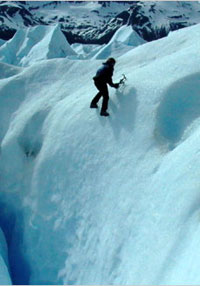你是一个登山运动的爱好者吗?那你以后可要三思而后行了。一项新的研究表明攀登海拔很高的山,会损害大脑细胞,并影响运动机能。

If you’ve ever fantasized about scaling Mount Everest, think again. A new study of professional mountain climbers shows that high-altitude climbing causes a subtle loss of brain cells and motor function.
Italian researchers used magnetic resonance imaging to look at the brains of nine world-class mountain climbers who had at least 10 years of experience, including expeditions to Mount Everest and K2. The climbers ranged in age from 31 to 52, with an average age of just under 38, and were used to climbing to altitudes of at least 4,000 meters (two-and-a-half miles, or over 13,000 feet) several times a year.
The scientists, who published their findings in the October issue of the European Journal of Neurology, compared the climbers’ M.R.I. brain scans with 19 age- and sex-matched healthy control subjects. A number of neuropsychological tests were also carried out to assess the climbers’ cognitive abilities, including memory and motor functions.
On scans, the climbers showed a reduction in both white and gray matter in various parts of the brain. Overall, the researchers found that the cognitive abilities that were most likely to be affected were the climbers’ executive function and memory.
Six of the nine climbers had lower than average scores on the Digit Symbol test, which measures executive functions. Three out of nine scored lower than average on memory tests, while four scored below average on a visual-motor function test. The study authors noted that the results “are most likely to be due to progressive, subtle brain insults caused by repeated high-altitude exposure.”
Other studies have shown links between brain problems and repeated exposure to extreme conditions. The British Journal of Sports Medicine reported in 2004 that scuba diving may have long-term negative effects on the brain, particularly when performed in extreme conditions, such as cold water, more than 100 dives per year, and diving below 40 meters.
And last year, researchers at New York University noted that high-altitude illness is a growing concern in sports medicine given the increasing popularity of extreme sports like high-altitude mountaineering, skiing and snowboarding. The report noted that about 20 percent of tourists to Colorado report acute mountain sickness, and complications arising from sports activities at high altitudes, such as the potentially fatal conditions of pulmonary and cerebral edema, are on the rise.
(来源:《纽约时报》网站 实习生许雅宁)
我要了解更多趣味百科知识